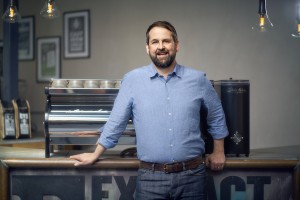A Bristol coffee roasting firm that started life as a small coffee cart at markets and festivals has marked its 11th year in business by opening a barista training facility in London.
St Werburghs-based Extract Coffee Roasters has built a strong reputation in the capital and currently supplies more than 70 cafes, restaurants and iconic venues there including Searcys at St Paul’s Cathedral, The Connaught, Deliciously Ella’s Mae Deli and Regent’s University. 
Now it has joined 50 other businesses based in the Sustainable Bankside development close to vibrant Borough Market in South London where it has built its training centre using locally sourced recycled materials destined for landfill including an old Covent Garden pub floor for the espresso bar while the benches are made from leftover supplies sourced from a housing project in Victoria.
Extract Coffee Roasters co-founder Lee Bolam, pictured, said: “Having supplied many of London’s finest cafes and restaurants over the last seven years, it’s great to finally have a place of learning in the capital to support our growing Extract community with training and business support.
“We’re fully committed to sustainability at our Bristol base; from roasting our coffee on four second-hand roasters which we restored ourselves, to recycling all our waste coffee grounds, and using 90% renewable energy to power the roastery. It’s great to finally have a place in London which is also in line with our sustainable values.”
Sustainable Bankside has become Europe’s largest community of sustainable start-ups with businesses spanning transport, building, energy, food and fashion.
Extract has grown from supplying a handful of businesses in Bristol to more than 500 independent cafes, fine dining restaurants, hotels, offices, bars and museums across the UK.
For the past two years it has support London homelessness charity The Passage, providing barista training to homeless and vulnerable adults as part of its Hotel School training programme in collaboration with the Goring Hotel. Two-thirds of the students are now in full-time work – a number which continues to grow.





























